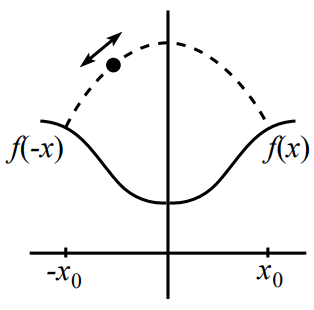Bouncing Between Surfaces

Consider the following generalization of the previous problem .
Now let a ball bounce back and forth between a surface defined by (for ) and its reflection across the -axis (for Assume that initial conditions have been set up so that the ball’s motion forever lies in one parabola, with the contact points and
For what function is the magnitude of the change in the horizontal component of the ball’s momentum at each bounce independent of
This section requires Javascript.
You are seeing this because something didn't load right. We suggest you, (a) try
refreshing the page, (b) enabling javascript if it is disabled on your browser and,
finally, (c)
loading the
non-javascript version of this page
. We're sorry about the hassle.
Assume that we can neglect the ball's size.
Let the coordinates be such that the highest point is reached at x = 0 , y = y 0 , t = 0 .
The motion of the ball then is described by the parametrization
y ( t ) = y 0 − 2 1 g t 2
x ( t ) = v x t .
Substituting t = v x x into the expression for y, reveals that the shape of the parabola is defined by
y ( x ) = y 0 − 2 1 g v x 2 x 2 .
Hence we have d x d y = v x 2 − g x .
f(x) must be perpendicular to this, so that f ′ ( x ) = g x v x 2 .
If the horizontal momentum m v x is independent of x, v x can be considered a constant.
Suppose f ( x ) = a ln ∣ x ∣ + b , then f ′ ( x ) = x a so that our function is given by
f ( x ) = g v x 2 ln ∣ x ∣ + b where b is an arbitrary constant.